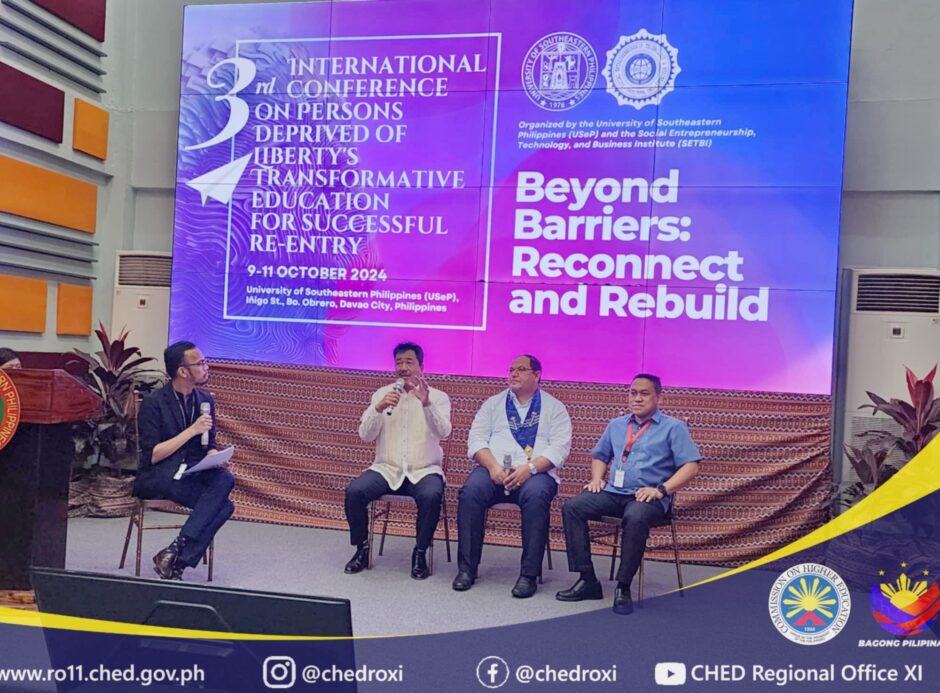Meet the Author
Dr. Aland Mizell is with the University of Mindanao School of Social Science, President of the MCI and a regular contributor to The Kurdistan Tribune, Kurdishaspect.com, Mindanao Times and Kurdish Media.You may email the author at:aland_mizell2@hotmail.com.Become a Member today!
Categories
Category Archives: His Articles
SETBI’s College Education Behind Bars Celebrates Third Commencement at the Davao Prison and Penal Farm
SETBI’s College Education Behind Bars Celebrates Third Commencement at the Davao Prison and Penal Farm Continue reading
Posted in His Articles
Comments Off on SETBI’s College Education Behind Bars Celebrates Third Commencement at the Davao Prison and Penal Farm
The Mutual Benefits of Church/Faith Based Groups-SETBI College Education Behind Bars School Partnerships
In accordance with humanity’s worth value and considering the human heart, spirit, mind, and physical being, we understand that holistically we live in a physical and spiritual world. The absence of one aspect will lead us to the collapse of … Continue reading
Posted in His Articles
Comments Off on The Mutual Benefits of Church/Faith Based Groups-SETBI College Education Behind Bars School Partnerships
Jerwin Capuras Story : MCI Scholarship program pulled me, and my family, out of the cycle of poverty.
First Part: A story of gratitude andhope: how MCI scholarship changed everything. Thank you, sir. Sir Aland has been a mentor to me since my youth, and it is such an honor to be introduced by my hero. Last night, … Continue reading
Posted in His Articles
Comments Off on Jerwin Capuras Story : MCI Scholarship program pulled me, and my family, out of the cycle of poverty.
VP Sara is no rush to Become next President of the Philippines in 2028
Many Filipinos are are tired of all sweet-talking, fork-tongued politicians who are very religious and observe good manners and right conduct when in public, but continue suck to dry Filipinos—men and women, young and old, of all faiths and ages—through … Continue reading
Posted in His Articles
Comments Off on VP Sara is no rush to Become next President of the Philippines in 2028
The President’s Year-End Message 2024
As we say in our Social Entrepreneurship, Technology and Business Institute (SETBI), we are better than yesterday, but we are not done yet! Happy New Year! As we enter 2025, I pray you are experiencing abounding peace and joy. Each … Continue reading
Posted in His Articles, His Videos
Comments Off on The President’s Year-End Message 2024
Minority Care International Distribution of Eye Glasses in Barangay Linan South Cotabato
This is MCI ‘s 13th distribution of eye glasses in varies communities including the Personal of Deprive liberty in DAPECOL . Recognizing the profound impact of clear vission on indiviudals lives. Minority Care international Restoring vision annual eye care projects , … Continue reading
Posted in His Articles
Comments Off on Minority Care International Distribution of Eye Glasses in Barangay Linan South Cotabato
SETBI Celebrate Fifth Commencement Exercises
SETBI Celebrate Fift Commencement Exercises Fifteen PDL at the College Education Behind Bars put on their caps and gowns on Thursday to grab their diploma and kickstart a brigther future for themselves. Fifteen PDL completed their Senior Highs School diploma … Continue reading
Posted in His Articles
Comments Off on SETBI Celebrate Fifth Commencement Exercises
More Than PDL
I𝗻𝗰𝗮𝗿𝗰𝗲𝗿𝗮𝘁𝗲𝗱 𝗯𝘂𝘁 𝗲𝗱𝘂𝗰𝗮𝘁𝗲𝗱: 𝗦𝗶𝘅 𝗣𝗗𝗟𝘀 𝗲𝗮𝗿𝗻 𝗰𝗼𝗹𝗹𝗲𝗴𝗲 𝗱𝗲𝗴𝗿𝗲𝗲 𝘁𝗵𝗿𝗼𝘂𝗴𝗵 𝗴𝗿𝗼𝘂𝗻𝗱𝗯𝗿𝗲𝗮𝗸𝗶𝗻𝗴 𝗚𝗼𝘃𝘁, 𝗡𝗚𝗢, 𝗦𝗨𝗖 𝗽𝗮𝗿𝘁𝗻𝗲𝗿𝘀𝗵𝗶𝗽 Physically incarcerated but now intellectually free, six (6) persons deprived of liberty (PDLs) from Davao Prison and Penal Farm (DPPF) earned their college degree today, proving … Continue reading
Posted in His Articles
Comments Off on More Than PDL
Social Entrepreneurship Technology and Business Institute (SETBI) and Department of Education ( DepED) signed the memorandum of agreement to offer Senior High School inside College Education Behind Bars (CEBB)
Social Entrepreneurship Technology and Business Institute (SETBI) and Department of Education ( DepED) signed the memorandum of agreement to offer Senior High School inside College Education Behind Bars (CEBB) Continue reading
Posted in His Articles
Comments Off on Social Entrepreneurship Technology and Business Institute (SETBI) and Department of Education ( DepED) signed the memorandum of agreement to offer Senior High School inside College Education Behind Bars (CEBB)
How to Use Technical Vocational Education Programs to Close the Skills Gap
Minority Care International (MCI) has long been providing financial and advisory assistance to minorities, especially underprivileged members of communities, for broadening and deepening delivery of educational services. The globalization along with the independence of various economies has resulted in creating … Continue reading
Posted in His Articles
Comments Off on How to Use Technical Vocational Education Programs to Close the Skills Gap

